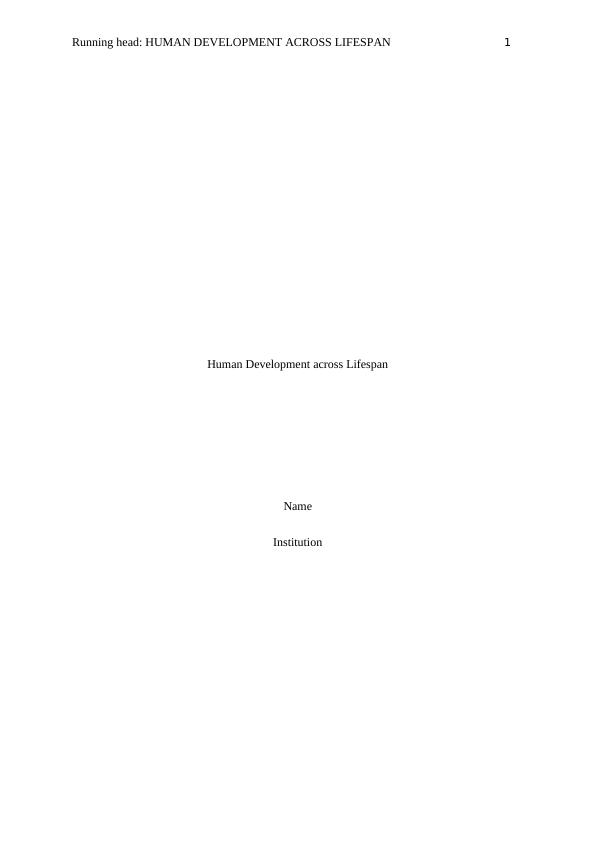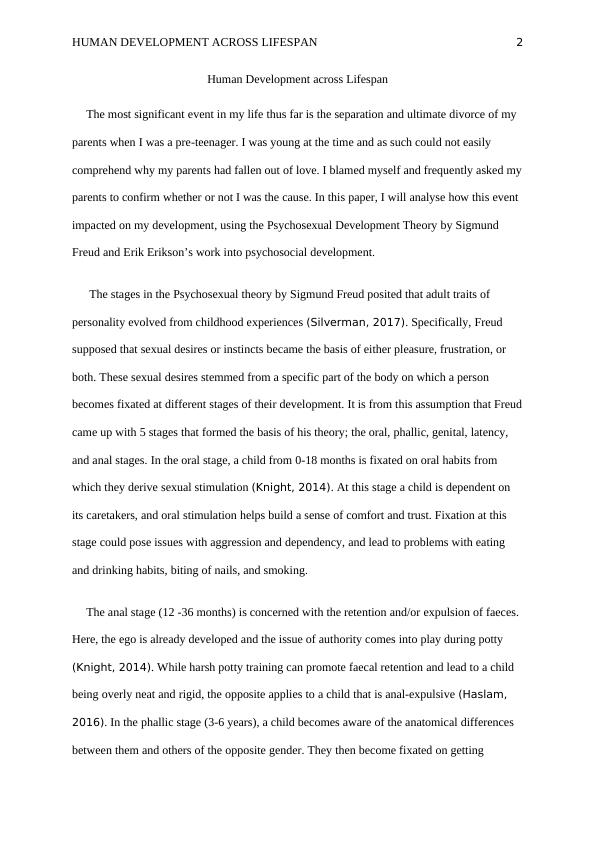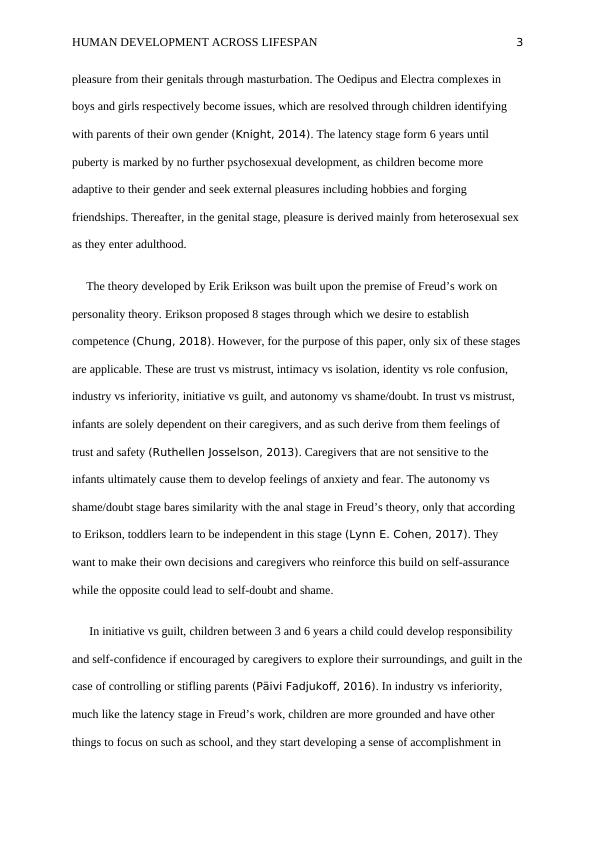Human Development across Lifespan
Added on 2022-10-01
7 Pages1766 Words72 Views
Running head: HUMAN DEVELOPMENT ACROSS LIFESPAN 1
Human Development across Lifespan
Name
Institution
Human Development across Lifespan
Name
Institution

HUMAN DEVELOPMENT ACROSS LIFESPAN 2
Human Development across Lifespan
The most significant event in my life thus far is the separation and ultimate divorce of my
parents when I was a pre-teenager. I was young at the time and as such could not easily
comprehend why my parents had fallen out of love. I blamed myself and frequently asked my
parents to confirm whether or not I was the cause. In this paper, I will analyse how this event
impacted on my development, using the Psychosexual Development Theory by Sigmund
Freud and Erik Erikson’s work into psychosocial development.
The stages in the Psychosexual theory by Sigmund Freud posited that adult traits of
personality evolved from childhood experiences (Silverman, 2017). Specifically, Freud
supposed that sexual desires or instincts became the basis of either pleasure, frustration, or
both. These sexual desires stemmed from a specific part of the body on which a person
becomes fixated at different stages of their development. It is from this assumption that Freud
came up with 5 stages that formed the basis of his theory; the oral, phallic, genital, latency,
and anal stages. In the oral stage, a child from 0-18 months is fixated on oral habits from
which they derive sexual stimulation (Knight, 2014). At this stage a child is dependent on
its caretakers, and oral stimulation helps build a sense of comfort and trust. Fixation at this
stage could pose issues with aggression and dependency, and lead to problems with eating
and drinking habits, biting of nails, and smoking.
The anal stage (12 -36 months) is concerned with the retention and/or expulsion of faeces.
Here, the ego is already developed and the issue of authority comes into play during potty
(Knight, 2014). While harsh potty training can promote faecal retention and lead to a child
being overly neat and rigid, the opposite applies to a child that is anal-expulsive (Haslam,
2016). In the phallic stage (3-6 years), a child becomes aware of the anatomical differences
between them and others of the opposite gender. They then become fixated on getting
Human Development across Lifespan
The most significant event in my life thus far is the separation and ultimate divorce of my
parents when I was a pre-teenager. I was young at the time and as such could not easily
comprehend why my parents had fallen out of love. I blamed myself and frequently asked my
parents to confirm whether or not I was the cause. In this paper, I will analyse how this event
impacted on my development, using the Psychosexual Development Theory by Sigmund
Freud and Erik Erikson’s work into psychosocial development.
The stages in the Psychosexual theory by Sigmund Freud posited that adult traits of
personality evolved from childhood experiences (Silverman, 2017). Specifically, Freud
supposed that sexual desires or instincts became the basis of either pleasure, frustration, or
both. These sexual desires stemmed from a specific part of the body on which a person
becomes fixated at different stages of their development. It is from this assumption that Freud
came up with 5 stages that formed the basis of his theory; the oral, phallic, genital, latency,
and anal stages. In the oral stage, a child from 0-18 months is fixated on oral habits from
which they derive sexual stimulation (Knight, 2014). At this stage a child is dependent on
its caretakers, and oral stimulation helps build a sense of comfort and trust. Fixation at this
stage could pose issues with aggression and dependency, and lead to problems with eating
and drinking habits, biting of nails, and smoking.
The anal stage (12 -36 months) is concerned with the retention and/or expulsion of faeces.
Here, the ego is already developed and the issue of authority comes into play during potty
(Knight, 2014). While harsh potty training can promote faecal retention and lead to a child
being overly neat and rigid, the opposite applies to a child that is anal-expulsive (Haslam,
2016). In the phallic stage (3-6 years), a child becomes aware of the anatomical differences
between them and others of the opposite gender. They then become fixated on getting

HUMAN DEVELOPMENT ACROSS LIFESPAN 3
pleasure from their genitals through masturbation. The Oedipus and Electra complexes in
boys and girls respectively become issues, which are resolved through children identifying
with parents of their own gender (Knight, 2014). The latency stage form 6 years until
puberty is marked by no further psychosexual development, as children become more
adaptive to their gender and seek external pleasures including hobbies and forging
friendships. Thereafter, in the genital stage, pleasure is derived mainly from heterosexual sex
as they enter adulthood.
The theory developed by Erik Erikson was built upon the premise of Freud’s work on
personality theory. Erikson proposed 8 stages through which we desire to establish
competence (Chung, 2018). However, for the purpose of this paper, only six of these stages
are applicable. These are trust vs mistrust, intimacy vs isolation, identity vs role confusion,
industry vs inferiority, initiative vs guilt, and autonomy vs shame/doubt. In trust vs mistrust,
infants are solely dependent on their caregivers, and as such derive from them feelings of
trust and safety (Ruthellen Josselson, 2013). Caregivers that are not sensitive to the
infants ultimately cause them to develop feelings of anxiety and fear. The autonomy vs
shame/doubt stage bares similarity with the anal stage in Freud’s theory, only that according
to Erikson, toddlers learn to be independent in this stage (Lynn E. Cohen, 2017). They
want to make their own decisions and caregivers who reinforce this build on self-assurance
while the opposite could lead to self-doubt and shame.
In initiative vs guilt, children between 3 and 6 years a child could develop responsibility
and self-confidence if encouraged by caregivers to explore their surroundings, and guilt in the
case of controlling or stifling parents (Päivi Fadjukoff, 2016). In industry vs inferiority,
much like the latency stage in Freud’s work, children are more grounded and have other
things to focus on such as school, and they start developing a sense of accomplishment in
pleasure from their genitals through masturbation. The Oedipus and Electra complexes in
boys and girls respectively become issues, which are resolved through children identifying
with parents of their own gender (Knight, 2014). The latency stage form 6 years until
puberty is marked by no further psychosexual development, as children become more
adaptive to their gender and seek external pleasures including hobbies and forging
friendships. Thereafter, in the genital stage, pleasure is derived mainly from heterosexual sex
as they enter adulthood.
The theory developed by Erik Erikson was built upon the premise of Freud’s work on
personality theory. Erikson proposed 8 stages through which we desire to establish
competence (Chung, 2018). However, for the purpose of this paper, only six of these stages
are applicable. These are trust vs mistrust, intimacy vs isolation, identity vs role confusion,
industry vs inferiority, initiative vs guilt, and autonomy vs shame/doubt. In trust vs mistrust,
infants are solely dependent on their caregivers, and as such derive from them feelings of
trust and safety (Ruthellen Josselson, 2013). Caregivers that are not sensitive to the
infants ultimately cause them to develop feelings of anxiety and fear. The autonomy vs
shame/doubt stage bares similarity with the anal stage in Freud’s theory, only that according
to Erikson, toddlers learn to be independent in this stage (Lynn E. Cohen, 2017). They
want to make their own decisions and caregivers who reinforce this build on self-assurance
while the opposite could lead to self-doubt and shame.
In initiative vs guilt, children between 3 and 6 years a child could develop responsibility
and self-confidence if encouraged by caregivers to explore their surroundings, and guilt in the
case of controlling or stifling parents (Päivi Fadjukoff, 2016). In industry vs inferiority,
much like the latency stage in Freud’s work, children are more grounded and have other
things to focus on such as school, and they start developing a sense of accomplishment in

End of preview
Want to access all the pages? Upload your documents or become a member.
Related Documents
Sigmund Freud Vs Eric Erikson | Assignmentlg...
|10
|1712
|312
Psychological Theories on Lifespan Developmentlg...
|2
|1742
|113
Freud's Theory of Psychosexual Developmentlg...
|5
|735
|183
Differences in the Views of Developmentlg...
|4
|563
|21
Psychosocial Development across the Lifespanlg...
|5
|871
|250
Week 1 Human Growth and Development Projectlg...
|5
|1254
|31
